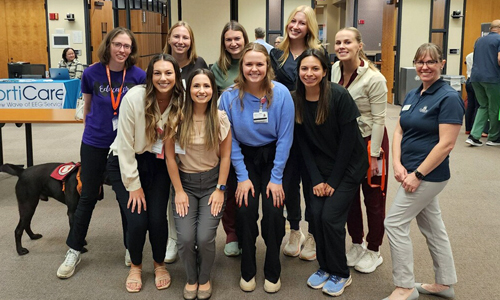 Group photo of Aurora Program Director, Tabitha Althoff (far left) and CU Academic Advisor, Lucy Glaser (far right) with students at the 2024 Wisconsin Neurodiagnostic Society (WISET) Annual Conference in Milwaukee, WI.
Group photo of Aurora Program Director, Tabitha Althoff (far left) and CU Academic Advisor, Lucy Glaser (far right) with students at the 2024 Wisconsin Neurodiagnostic Society (WISET) Annual Conference in Milwaukee, WI.
Final Two Years: Hospital Phase
In their placement with Aurora Health Care, students will learn about NDT theory through coursework and gain valuable clinical experience by working with their medical experts.
The NDT program prepares students to take three of eight professional exams, greatly increasing career options for graduates. After junior year, students are eligible to take the EEG board examination. Upon passing, students can pursue a paid internship as a registered EEG Technologist, to enhance their skills and build a network before their final year in the program.
Students take their Evoked Potential board examination during their senior year, allowing them to become dual registered. The final semester of the program is focused on intraoperative neuromonitoring. Graduates of the program enter the field as a Neurodiagnostic Specialist I or II based on their registrations, degree, and clinical experience earned. Currently less than 1% of NDTs nationwide hold three registrations and a bachelor’s degree in NDT, putting graduates of Carroll’s program at the top of their field. Because Neurodiagnostic credentialing and accreditations are internationally recognized, graduates have job opportunities across the world.